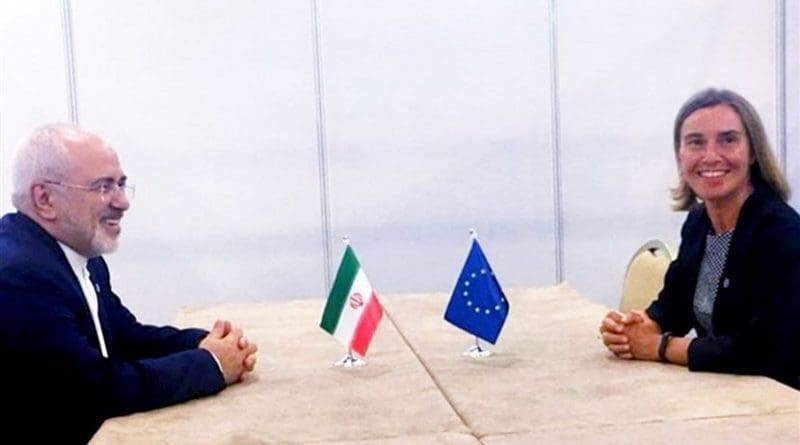Europe’s Dilemma As US Increases Pressure On Iran – OpEd
By Arab News
By Cornelia Meyer*
The Europeans were caught in the middle when the US last year unilaterally withdrew from the Joint Comprehensive Plan of Action (JCPOA), which had been signed in 2015 between the permanent five representatives of the UN Security Council plus Germany and Iran. Their stance was that Tehran had complied with the letter of the agreement, which had been attested by the International Atomic Energy Agency.
The EU’s High Representative for Foreign Affairs and Security Policy Federica Mogherini even tried to devise an alternate non-dollar denominated payment system to enable European companies to circumvent the US sanctions and continue trading with Iran. The plan was a flop. European companies were afraid that, even if they circumvented the dollar, trading with Iran might shut them out of the US banking system. The US is still the world’s largest economy and Iran, with its 80 million people and roughly $440 billion of gross domestic product, can’t stack up to that. However, Switzerland has devised a smaller non-dollar denominated payment channel for humanitarian goods like medicines, which are exempt from US sanctions, and that mechanism seems to be working.
One year on, US President Donald Trump and National Security Adviser John Bolton want to apply maximum pressure on Iran. On May 2, they cancelled the exemptions from oil sanctions they had granted to eight nations and, since then, the rhetoric has ratcheted up considerably.
Iran’s reaction was to give the remaining JCPOA countries an ultimatum of two months or it would resume activities regulated under articles 26 and 36 of the agreement. This means they would no longer sell heavy water and enriched uranium to Russia and Oman, but store them in the country. This did not go down well in Europe.
Unlike the US, Europe is the Middle East’s near neighbor, and the Europeans are concerned about the lack of stability in their vicinity. Failed states like Libya and Syria and the tenuous situation in Iraq have resulted in streams of refugees that European governments find difficult to deal with. It has also given rise to alt-right movements and parties, who have written xenophobic and Islamophobic slogans on their banners.
Europe, then, is looking on with bated breath at recent developments, as the US is sending an aircraft carrier and airborne squadrons to the Gulf. Trump has also warned that he could send 100,000 soldiers to the Middle East. On Wednesday, the US ordered all non-essential personnel in its diplomatic missions in Iraq to return for fear that they might be attacked — only to be contradicted by Maj. Gen. Chris Ghika, the British deputy commander of Operation Inherent Resolve (OIR), the US-led coalition against Daesh, that there was no increased danger from Iranian-backed forces in Iraq and Syria.
Also, this week, two Saudi oil tankers and one each from the UAE and Norway were sabotaged off the shores of the port of Fujairah, and two drones damaged the east-west oil pipeline in Saudi Arabia. Houthi rebels assumed responsibility for the drone attacks. The pipeline is important. It was built in the 1980s during the Iran-Iraq War precisely to circumvent the Arabian Gulf and the Strait of Hurmuz. Twenty percent of global crude oil trade has to pass through the Strait of Hormuz to reach global markets, making it a potential choke point for worldwide oil supplies.
Against that backdrop, Europe and, for that matter, the world fear that any spark might ignite a situation so laden with tension, although all parties assure that they do not want war. The Middle East is a geopolitical powder keg, which could hardly take yet another armed conflict.
Europe is concerned. Everybody prefers to live in a peaceful neighborhood. This brings us to what the Europeans can do. Norbert Roettgen, a Member of the German Bundestag and head of its foreign affairs select committee, proposed that Germany, France and the UK (the Europeans signatories to the JCPOA) should take a leadership role in trying to mediate in the matter. He admitted that the JCPOA had some faults, especially in as much as it did not include Iran’s military involvement and influence in Iraq, Syria, Lebanon, Gaza and Yemen. He is of the opinion that these issues need to be addressed, but he felt that the JCPOA was a good starting point. He reinforced that Iran had adhered to the letter of the agreement but opined that the two-month ultimatum was singularly unhelpful.
Roettgen had a point. Alas, it will be difficult to get the Europeans to act as one at this point. Brexit makes the British position difficult, while France and Germany are currently at loggerheads on many issues. It would also be important to engage in a meaningful way with the US administration in order for any efforts to mediate to be effective.
In this context, it did not help that US Secretary of State Mike Pompeo cancelled a scheduled visit with German Foreign Minister Heiko Maas at short notice in order to go to Iraq. Pompeo was also not able to convince the EU foreign ministers when he met them in Brussels on Monday. Mogherini was very clear in as much as she wanted to see tensions cooled. Pompeo’s talks with Russian President Vladimir Putin and Foreign Minister Sergey Lavrov did not go any further.
In the meantime, the saber-rattling continues and tensions are on the rise. While both Trump and Iran’s Supreme Leader Ali Khamenei say that they do not want war, things could unintentionally get out of hand. Roettgen’s notion that there might be a role for the Europeans to mediate may have some validity. However, they would need to have a very clear game plan in order to stand a chance of succeeding — however slim that chance might be.
• Cornelia Meyer is a business consultant, macro-economist and energy expert. Twitter: @MeyerResources

